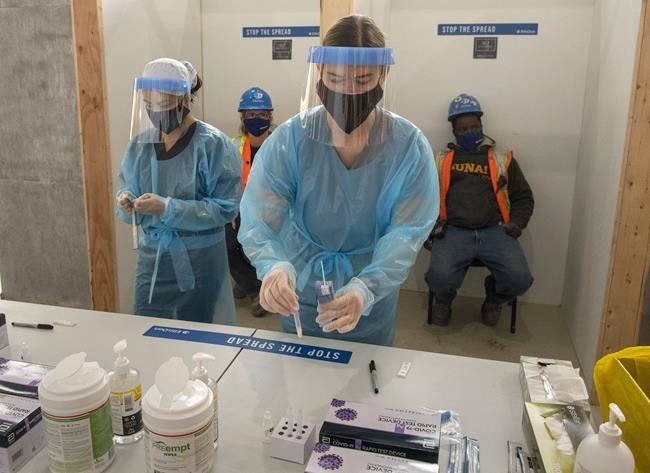Toronto and neighboring Peel Region will remain under a stay-at-home order for at least two more weeks, the Ontario government said Friday, granting a request from local officials to delay easing restrictions in the COVID-19 hot spots.
Premier Doug Ford said local officials know their regions best and his support for their public health advice is "unwavering."
"When they ask for more time ... as premier I will listen," Ford said.
The government also decided to maintain the stay-at-home order for the North Bay, Ont., area – which has seen a spike in variants of COVID-19 – while loosening restrictions for York Region, which had sought the removal of the strictest measures.
Toronto, Peel and North Bay are now the only regions that will remain under the strictest orders until at least March. 8.
York Region, however, will see restrictions on businesses and gatherings reduced next week as it moves to the red – or second-highest – category of Ontario's tiered pandemic restrictions framework.
Ford said residents in the three shutdown areas shouldn't travel to neighbouring reopened regions for services.
"We're relying on the on the people of Ontario to follow the protocols," he said.
The Progressive Conservative government has been loosening health measures across the province this month despite predictions that doing so could set off a third wave of infections.
Federal forecasts issued Friday said COVID-19 variants that have now been found in every province could fuel a surge of 20,000 new cases per day by mid-March if public health restrictions are relaxed.
When asked about those projections, Ford said his government is being cautious in the hardest-hit areas and regions with fewer cases can't be compared with hot spots like Toronto.
NDP Leader Andrea Horwath said Ford's decision to reopen York Region and other areas is "putting politics ahead of public health."
The president of the Registered Nurses' Association of Ontario expressed similar concerns. Doris Grinspun said her organization is pleased that Ford listened to health officials in Toronto, Peel and North Bay, but the shutdown should have been extended in York too.
"What happened in York Region is political entirely," Grinspun said. "People in that region will pay the price in terms of an increased spike."
A mayor of one of the communities in York Region, who had previously pushed for the area to be moved into the red category of the restrictions system, called Friday for further measures.
Markham, Ont., Mayor Frank Scarpitti said he's asking the region's top doctor to further limit social gatherings and capacity for businesses and close all sports facilities while the region assess the impact of virus variants.
"It is critically important that residents continue to stay at home as much as possible and only go out for essential trips," Scarpitti said in a statement.
The province also said Friday that it was moving the region covered by the Lambton public health unit to the red category of its restrictions framework due to worsening trends. The region's top doctor said COVID-19 cases doubled last week compared with the previous week, with many linked to institutional outbreaks.
Meanwhile, the province said earlier Friday that residents aged 80 and older would be contacted over the next several weeks about vaccination appointments.
Primary physicians may begin that outreach while an online booking system and service desk for appointments are still in development.
The appointments will likely begin in March, said retired Gen. Rick Hillier, who is leading the vaccine rollout. He encouraged people to reach out to those they know in that age group to ensure they learn about vaccine opportunities.
Hillier said the province likely won't start vaccinating those younger than 80 until at least April or May.
Ontario was to receive close to 157,000 doses of the Pfizer-BioNTech vaccine this week and said it expects weekly supply from the company to range between 173,000 and 186,000 doses through the end of March.
Doses of the Moderna vaccine for next week will be lower than expected, at 47,400, but supply is expected to increase in March.
That increase will coincide with an expected expansion of the vaccine rollout to target the 80 and older group, seniors in congregate care and all Indigenous adults.
Ontario saw a slowdown in its immunization efforts as the country was hit with significant delays in vaccine shipments this month. The province has so far been focusing on the highest-priority groups, which include long-term care residents and some health-care staff.
The province has administered 518,834 doses of a COVID-19 vaccine so far.
Ontario reported 1,150 new cases of COVID-19 on Friday and 47 more deaths from the virus.
This report by The Canadian Press was first published Feb. 18, 2021.
Holly McKenzie-Sutter, The Canadian Press




